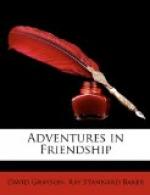I began to watch the skies with some anxiety, and on Thursday I was delighted to see the weather become clearer, and a warm dry wind spring up from the southwest. On Friday there was not so much as a cloud of the size of a man’s hand to be seen anywhere in the sky, not one, and the sun with lively diligence had begun to make up for the listlessness of the past week. It was hot and dry enough to suit the most exacting hay-maker.
Encouraged by these favourable symptoms I sent word to Dick Sheridan (by one of Horace’s men) to come over bright and early on Saturday morning. My field is only a small one and so rough and uneven that I had concluded with Dick’s help to cut it by hand. I thought that on a pinch it could all be done in one day.
“Harriet,” I said, “we’ll cut the clover to-morrow.”
“That’s fortunate,” said Harriet, “I’d already arranged to have Ann Spencer in to help me.”
Yesterday morning, then, I got out earlier than usual. It was a perfect June morning, one of the brightest and clearest I think I ever saw. The mists had not yet risen from the hollows of my lower fields, and all the earth was fresh with dew and sweet with the mingled odours of growing things. No hour of the whole day is more perfect than this.
I walked out along the edge of the orchard and climbed the fence of the field beyond. As I stooped over I could smell the heavy sweet odour of the clover blossoms. I could see the billowy green sweep of the glistening leaves. I lifted up a mass of the tangled stems and laid the palm of my hand on the earth underneath. It was neither too wet nor too dry.
“We shall have good cutting to-day,” I said to myself.
So I stood up and looked with a satisfaction impossible to describe across the acres of my small domain, marking where in the low spots the crop seemed heaviest, where it was lodged and tangled by the wind and the rain, and where in the higher spaces it grew scarce thick enough to cover the sad baldness of the knolls. How much more we get out of life than we deserve!
So I walked along the edge of the field to the orchard gate, which I opened wide.
“Here,” I said, “is where we will begin.”
So I turned back to the barn. I had not reached the other side of the orchard when who should I see but Dick Sheridan himself, coming in at the lane gate. He had an old, coarse-woven straw hat stuck resplendently on the back of his head. He was carrying his scythe jauntily over his shoulder and whistling “Good-bye, Susan” at the top of his capacity.
Dick Sheridan is a cheerful young fellow with a thin brown face and (milky) blue eyes. He has an enormous Adam’s apple which has an odd way of moving up and down when he talks—and one large tooth out in front. His body is like a bundle of wires, as thin and muscular and enduring as that of a broncho pony. He can work all day long and then go down to the lodge-hall at the Crossing and




